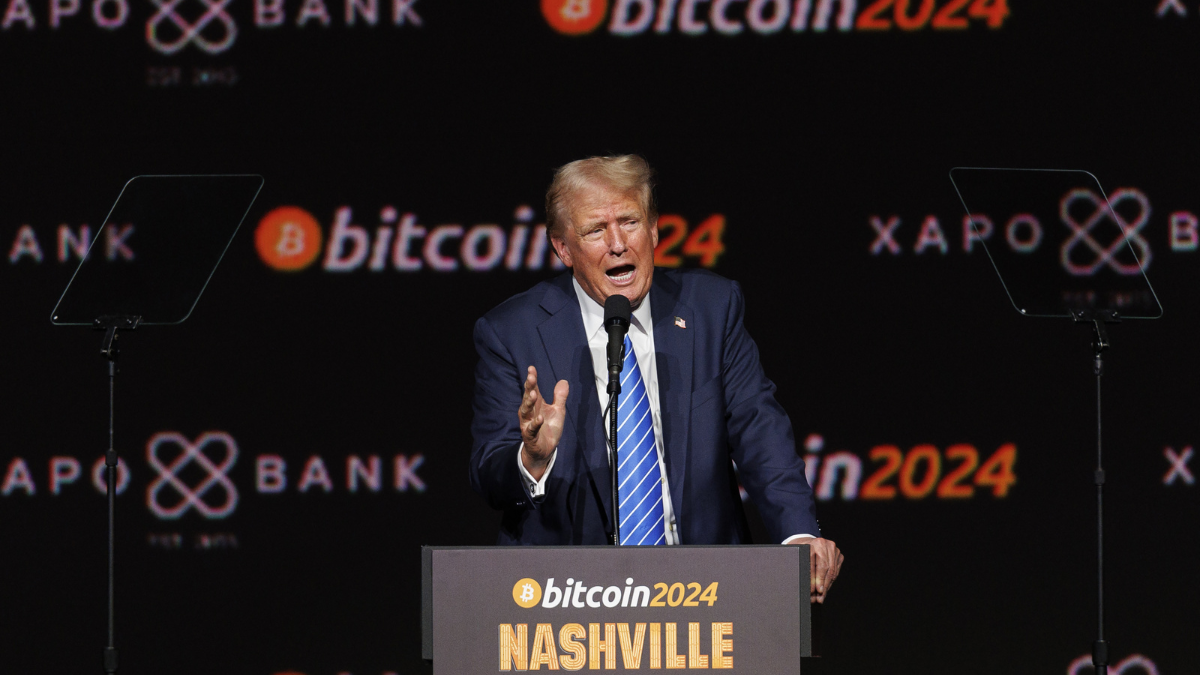Regulation
Trump Shocks Bitcoiners, Promises Crypto-Friendly Regulation If Re-elected

Donald Trump has announced his intention to fire the SEC chairman and appoint crypto-friendly regulators if he wins the 2024 presidency, aiming to make the United States a “crypto capital.” At a Bitcoin conference in Nashville, Trump pledged to form a cryptocurrency advisory council, establish a stablecoin framework, and support Bitcoin mining. His pro-crypto stance marks a significant shift, reflecting the growing political influence of the sector.
Sign up for your first morning dose of BizNews Insider to stay up to date on the content that matters. The newsletter will arrive in your inbox at 5:30 a.m. weekdays. Sign Up Here.
Join us for BizNews’ first investment-focused conference on Thursday 12 September in Hermanus, featuring leading experts Frans Cronje, Piet Viljoen and more. Get insights into electricity and harnessing South Africa’s gas bounty from new and familiar faces. Sign up Here.
By Teresa Xie, Stephanie Lai and Alicia Diaz
Donald Trump has said he will fire the chairman of the Securities and Exchange Commission and appoint crypto-friendly regulators if he returns to the White House, in an effort to woo crypto enthusiasts and leverage the industry’s growing influence in the political arena.
“This afternoon I’m going to lay out my plan to make the United States the cryptocurrency capital of the world and the Bitcoin superpower of the world, and we will do that,” Trump said at a Bitcoin conference in Nashville on Saturday.
The assembled crowd cheered loudly when Trump said he would fire SEC Chairman Gary Gensler, whose term does not expire until 2026. If he wins the presidency, Trump would have significant influence over the booming industry’s top regulators.
“We will have regulations, but from now on the rules will be written by people who love your industry, not hate it,” Trump said.
He also pledged to form a presidential advisory council for the cryptocurrency industry, create a regulatory framework for stablecoins, and called for a reduction in regulatory enforcement.
Zachary Bradford, co-founder and CEO of Bitcoin miner Cleanspark, described Trump’s speech as “a historic moment.” Trump made repeated references to miners and said that “America is going to be the undisputed Bitcoin mining powerhouse in the world.”
Change of tone
Nashville’s remarks are the latest demonstration of the former president’s embrace of the technology and his attempt to position himself as a champion of cryptocurrency interests.
Trump expressed skepticism about cryptocurrencies during his presidency, saying he was “not a fan” and that their values were “based on nothing,” but in his 2024 presidential campaign he has changed tack, increasingly highlighting Bitcoin in his wake and actively courting the cryptocurrency industry.
The shift reflects the sector’s growing importance in U.S. politics, as executives push to elect candidates with policies that support digital assets through ever-larger donations, in part through the Fairshake political action super committee, as well as Trump’s desire to reach new voters in his third presidential bid.
Republican Sen. Cynthia Lummis of Wyoming, who attended the Nashville conference, said she plans to draft a bill that would require the government to create a reserve of up to 1 million bitcoins over five years. The bill would require the government to hold the cryptocurrency for 20 years, and during those two decades it could only be used to reduce the national debt.
“The goal is to recognize the fact that Bitcoin is a durable asset,” he said on the sidelines of the conference. “It is digital gold and it is a hard asset that can back the U.S. dollar and provide assurance around the world that the U.S. dollar remains worthy of being a world currency.”
Bitcoin, which had risen as much as 2.9% on Saturday before Trump’s speech, was virtually unchanged at around $68,000 by the end of his speech.
Political power
Cryptocurrency industry donors have he paid more money in the 2024 election than in all previous cycles combined, according to OpenSecrets.
Trump’s economic agenda, which promises to lower tax rates and cut government regulation, has found a receptive audience among Wall Street and business interests eager to find an alternative to the policies of President Joe Biden and Vice President Kamala Harris, the likely Democratic nominee.
The cryptocurrency industry has bristled at what it sees as heavy-handed regulation under Biden, following the collapse of the FTX exchange and other scandals. Trump has pledged to promote bitcoin mining in the United States, protect cryptocurrency self-custody and block the Federal Reserve from issuing a central bank digital currency which would enter into competition with industry.
“I think it was pretty positive for the space, pretty bullish for the future,” said Paul Veradittakit, a managing partner at Pantera Capital Management who watched a livestream of Trump’s speech. He said he was “very excited that he wants America to be the crypto capital.”
Trump’s appearance at the conference comes during a frantic stretch of the 2024 race that has seen a failed assassination attempt against the former Republican president and Biden’s announcement Sunday that he would no longer seek reelection. The incumbent Democrat has endorsed Harris, 59, who is nearly two decades younger than Trump and threatens to undermine the inroads she has made with young voters and people of color.
Trump has Cryptocurrency policy discussed with Tesla Inc. Chief Executive Elon Musk, according to a person familiar with the talks. He has also hosted crypto-mining executives at his Mar-a-Lago resort and vowed to commute the sentence of Ross Ulbricht, who is serving life in prison after being convicted of running the Silk Road marketplace, where customers used virtual currencies to buy illegal drugs and hacking tools.
A digital display highlighting Trump’s keynote speech at Saturday’s Bitcoin 2024 conference.
More significantly, Trump’s campaign said in May that it would begin accepting donations in digital assets. Since then, it has raised $4 million in a mix of digital tokens, according to a campaign aide, who detailed the amount on condition of anonymity.
Among Trump’s biggest backers have been billionaire twins Cameron and Tyler Winklevoss, who run Winklevoss Capital Management and are big investors in Bitcoin. In his Nashville speech, Trump greeted the brothers by name and described them as “male models with brains.”
Both said they donated the equivalent of $1 million in cryptocurrency to a pro-Trump group, an amount that exceeded the maximum allowed. The amount exceeded the limit was returned to the brothers.
Before the speech, Trump was expected to meet with cryptocurrency industry donors on Saturday at a fundraiser where the seats It went up to $844,600Guests are expected to include the Republican nominee’s running mate, Senator J.D. Vance of Ohio, who has also taken an interest in cryptocurrencies and positioned himself as an advocate for the sector.
Read also:
© 2024 Bloomberg L.P.
Regulation
Cryptocurrency Regulation in Slovenia 2024

Slovenia, a small but highly developed European country with a population of 2.1 million, boasts a rich industrial history that has contributed significantly to its robust economy. As the most economically developed Slavic nation, Slovenia has grown steadily since adopting the euro in 2007. Its openness to innovation has been a key factor in its success in the industrial sector, making it a favorite destination for cryptocurrency enthusiasts. Many believe that Slovenia is poised to become a powerful fintech hub in Europe. But does its current cryptocurrency regulatory framework support such aspirations?
Let’s explore Slovenia’s cryptocurrency regulations and see if they can push the country to the forefront of the cryptocurrency scene. My expectations are positive. What are yours? Before we answer, let’s dig deeper.
1. Cryptocurrency Regulation in Slovenia: An Overview
Slovenia is known for its pro-innovation stance, providing a supportive environment for emerging technologies such as blockchain and cryptocurrencies. Under the Payment Services and Systems Act, cryptocurrencies are classified as virtual assets rather than financial or monetary instruments.
Regulation of the cryptocurrency sector in Slovenia is decentralized. Different authorities manage different aspects of the ecosystem. For example, the Bank of Slovenia and the Securities Market Agency supervise cryptocurrency transactions to ensure compliance with financial laws, including anti-money laundering (AML) and counter-terrorist financing regulations. The Slovenian Act on the Prevention of Money Laundering and Terrorist Financing (ZPPDFT-2) incorporates the EU’s Fifth Anti-Money Laundering Directive (5MLD) and aligns with the latest FATF recommendations. All virtual currency service providers must register with the Office of the Republic of Slovenia.
2. Cryptocurrency regulation in Slovenia: what’s new?
This year, there have been several noteworthy developments in the cryptocurrency sector in Slovenia:
July 25, 2024: Slovenia has issued a €30 million on-chain sovereign digital bond, the first of its kind in the EU, with a yield of 3.65%, maturing on 25 November 2024.
May 14, 2024: NiceHash has announced the first Slovenian Bitcoin-focused conference, NiceHashX, scheduled for November 8-9 in Maribor.
3. Explanation of the legal framework for cryptocurrency taxation in Slovenia
Slovenia’s cryptocurrency tax framework provides clear guidelines for both individuals and businesses. According to the Slovenian Tax Administration, tax treatment depends on the status of the trader and the nature of the transaction.
- Individuals: Income earned from cryptocurrencies through employment or ongoing business activities is subject to personal income tax. However, capital gains from trading or market fluctuations are exempt from taxation.
- Society: Capital gains from cryptocurrency activities are subject to a corporate income tax of 19%. Value added tax (VAT) generally applies at a rate of 22%, although cryptocurrency transactions considered as means of payment are exempt from VAT. Companies are not allowed to limit payment methods to cryptocurrencies only. Tokens issued during ICOs must comply with standard accounting rules and the Corporate Tax Act.
4. Cryptocurrency Mining in Slovenia: What You Should Know
Cryptocurrency mining is not restricted in Slovenia, but the income from mining is considered business income and is therefore taxable. This includes rewards from validating transactions and any additional income from mining operations. Both natural persons and legal entities must comply with Slovenian tax regulations.
5. Timeline of the evolution of cryptocurrency regulations in Slovenia
Here is a timeline highlighting the evolution of cryptocurrency regulations in Slovenia:
- 2013:The Slovenian Tax Administration has issued guidelines according to which income from cryptocurrency transactions should be taxed.
- 2017:The Slovenian Tax Administration has provided more detailed guidelines on cryptocurrency taxation, based on factors such as the trader’s status and the type of transaction.
- 2023The EU has adopted the Markets in Cryptocurrencies Regulation (MiCA), which establishes a uniform regulatory framework for cryptocurrencies, their issuers and service providers across the EU.
Final note
Slovenia’s approach to the cryptocurrency industry is commendable, reflecting its optimistic view of the future of cryptocurrency. The country’s balanced regulatory framework supports cryptocurrency innovation while protecting user rights and preventing illegal activities. Recent developments demonstrate Slovenia’s commitment to continuously improving its regulatory environment. Slovenia’s cryptocurrency regulatory framework sets a positive example for other nations navigating the evolving cryptocurrency landscape.
Read also: Cryptocurrency Regulation in Hong Kong 2024
Regulation
A Blank Slate for Cryptocurrencies: Kamala Harris’ Regulatory Opportunity

Photo by The Dhage of Shubham ON Disinfect
As the cryptocurrency landscape continues to evolve, the need for clear regulation has never been greater.
Vice President Kamala Harris is now leading the charge on digital asset regulation in the United States, presenting a unique opportunity for a clean slate. This fresh start can foster innovation and protect consumers. It can also pave the way for widespread adoption across industries, including real estate agencies, healthcare providers, and online gambling platforms like these online casinos in the uk. According to experts at SafestCasinoSites, these platforms have advantages such as bonus offers, a wide selection of games, and various payment methods. Ultimately, all this increased adoption could push the cryptocurrency market forward.
With that in mind, let’s take a look at the current state of cryptocurrency regulation in the United States, which is a complex and confusing landscape. Multiple agencies, including the Securities and Exchange Commission (SEC), the Commodity Futures Trading Commission (CFTC), and the Financial Crimes Enforcement Network (FinCEN), have overlapping jurisdictions, creating a fragmented regulatory environment. This lack of clarity has hindered innovation, as companies are reluctant to invest in the United States, fearing regulatory repercussions. A cohesive and clear regulatory framework is urgently needed to unlock the full potential of cryptocurrencies in the United States.
While the US struggles to find its footing, other countries, such as Singapore and the UK, are actively embracing the cryptocurrency industry with clear and supportive regulatory frameworks. This has led to a brain drain, with companies opting to set up in more hospitable environments.
Vice President Kamala Harris has a unique opportunity to change this narrative and clean up the future. cryptocurrency regulation. By taking a comprehensive and inclusive approach, it can help create a framework that balances consumer protection with innovation and growth. The time has come for clear and effective regulation of cryptocurrencies in the United States.
Effective regulation of digital assets is essential to fostering a safe and innovative environment. Key principles guiding this regulation include clarity, innovation, global cooperation, consumer protection, and flexibility. Clear definitions and guidelines eliminate ambiguity, while encouraging experimentation and development to ensure progress. Collaboration with international partners establishes consistent standards, preventing regulatory arbitrage. Strong safeguards protect consumers from fraud and market abuse, and adaptability allows for evolution in response to emerging trends and technologies, striking a balance between innovation and protection.
The benefits of effective cryptocurrency regulation are many and far-reaching. By establishing clear guidelines, governments can attract investors and traditional users, spurring growth and adoption. This, in turn, can position countries like the United States as global leaders in financial technology and innovation. Strong protections will also increase consumer confidence in digital assets and related products, boosting economic activity.
A thriving cryptocurrency industry can significantly contribute to GDP and job creation, which has a positive impact on the overall economy. Furthermore, effective regulation has paved the way for the growth of many companies such as tech startups, online casinos, and pharmaceutical companies, proving that clear guidelines can unlock new opportunities without stifling innovation. This is a great example of how regulation can alleviate fears of regressive policies, even if Kamala Harris does not repeal the current progressive approach. By adopting effective regulation, governments can create fertile ground for the cryptocurrency industry to thrive, driving progress and prosperity.
Regulation
Think You Own Your Crypto? New UK Law Would Ensure It – DL News

- The UK Law Commission has developed a bill that will address a situation of legal uncertainty.
- The commission’s goal is to ensure that cryptocurrencies are legally treated as personal property.
UK law is not entirely clear whether cryptocurrencies can be considered personal property.
This is according to the UK Law Commission, which argues that while most investors assume that when they buy cryptocurrencies, they are “acquiring property rights in the same way as buying, say, a watch or a laptop.”
“As the law currently stands, this is not necessarily the case,” the respected legal body said in a new report on Tuesday.
The report was accompanied by a solution: a new bill to consolidate the legal status of digital assets as personal property.
This could be huge for the estimated 4.7 million Britons valued hold cryptocurrencies.
“This will allow the courts to determine a range of issues,” the report says.
If passed, the law would help clarify how cryptocurrencies are treated in cases of bankruptcy, estate planning or theft.
Flexible law
The commission is an independent body responsible for reviewing UK law. It began investigating whether English and Welsh property laws apply to digital assets in 2020.
Join the community to receive our latest stories and updates
At the time, then-Chancellor of the Exchequer Rishi Sunak expressed ambitions to transform the UK into a cryptocurrency hub as Britons invested more.
In 2023, the commission decided that, in most cases, the legislation of England and Wales is sufficiently flexible to regulate cryptocurrencies.
This means that any asset, from Bitcoin to non-fungible tokens and some types of digital contracts, can be considered personal property, without Parliament having to write extensive new laws.
There was one small area of uncertainty, however: it was unclear whether cryptocurrencies fell within the two categories of personal property recognised under UK law.
These two categories are made up of tangible assets (cars, laptops, bags) and intangible assets (contracts, stocks, and debt).
The bill that will now go to Parliament to be converted into law aims to remedy this situation.
Without that clarification, courts may try to lump cryptocurrencies together with intangible assets, said Adam Sanitt, head of litigation, knowledge, innovation and corporate support EMEA at law firm Norton Rose Fulbright. DL News in March.
This is problematic because intangible assets are creations of the legal system, while cryptocurrencies are not.
“How the law treats digital assets, what rights you have over them, how you own them, how you transfer them to other people—that treatment is different, because digital assets don’t exist by virtue of the legal system, but independently of it,” Sanitt said.
The money in your bank account, for example, is a legal creation. The government could pass a law to cancel it.
However, if the UK passed a law banning Bitcoin, Bitcoin would not cease to exist.
Sanitt said: “That’s why digital assets are so important: neither the government nor the legal system can take them away from you.”
Contact the author at joanna@dlnews.com.
Regulation
The Solution the Cryptocurrency Industry Needs

The cryptocurrency industry has performed remarkably well since its inception, but now faces a critical hurdle that requires careful consideration and regulatory expertise to overcome. Despite the industry’s rapid growth and rate of global adoption, the gap between the industry and global regulation is only widening as new innovations break through into the public domain.
Although efforts are being made on both sides, regulators’ lack of familiarity with cryptocurrencies and the industry’s lack of regulatory expertise are hindering innovation in the sector. To address this issue, traditional financial institutions (TradFi) such as MultiBank Group have started venturing into the cryptocurrency sector.
The regulatory gap
Over the past decade, the cryptocurrency industry has grown dramatically as tech entrepreneurs and forward-thinking thinkers have founded a plethora of crypto platforms and protocols to push the boundaries of the space. The problem faced by these newcomers, who are often unfamiliar with the hurdles posed by financial regulators, can quickly overwhelm and stall operations.
On the other hand, regulators more attuned to TradFi systems may be equally stifled by the complexities of decentralization and blockchain technology. The unfamiliarity experienced by both innovators and regulators creates a stark regulatory divide between both sides, leading to misunderstandings and potential conflicts.
To overcome this lack of communication, a bridge must be built to bridge the gap, ensuring future stability for the cryptocurrency industry and clearer legislation from regulators.
Efforts to bridge the gap between industry
The gap between the cryptocurrency industry and regulators is slowly narrowing as efforts to regulate cryptocurrencies and Web3 space activities are gaining momentum. Specific regulatory actions are taking place in many countries, aimed at providing greater oversight of cryptocurrency transactions, cryptocurrency exchanges, and initial coin offerings (ICOs).
Despite being a positive step in the right direction, these new regulations can differ significantly between jurisdictions around the world. This fragmentation results in a regulatory environment filled with obstacles, bottlenecks, and varying requirements and prohibitions. As cryptocurrency companies and TradFi institutions attempt to navigate the minefield, the regulatory maze becomes increasingly convoluted.
TradFi institutions like MultiBank Group are working to solve this problem, as one of the largest financial derivatives institutions in the world with over 12 licenses across all continents. Founded in 2005, the Group has an impeccable and trustworthy reputation globally, extensive expertise in financial regulation and has now ventured into the cryptocurrency space via MultiBank.io.
MultiBank.io: TradFi Excellence in the Crypto Space
Expanding into the cryptocurrency space via MultiBank.io has enabled MultiBank Group to provide regulatory clarity and trust to the digital asset industry. With a substantial daily trading volume of $12.1 billion, the timely decision to enter the cryptocurrency space has the potential to set regulatory precedents and standards for years to come.
By helping to develop sensible and well-considered regulations, MultiBank.io’s established reputation allows the company to communicate effectively and clearly with regulators. Unlike others in the industry without regulatory expertise, MultiBank.io facilitates the Group’s commitment to rigorous regulatory standards, the scope of oversight and establishes the necessary transparency.
The company’s approach ensures that regulatory licenses are pre-acquired, compliance is met globally without jurisdictional barriers, and transactions remain secure at all times. By helping to create robust regulations that are both clear and innovation-friendly, MultiBank Group looks forward to standardizing the entire cryptocurrency industry for other potential innovators.
One of the biggest challenges in establishing a clearly constructed bridge between regulators and the cryptocurrency industry is effective communication. By leveraging its institutional background TradFi and acting as an intermediary with regulators, MultiBank Group is able to translate the needs of the industry to those who shape it.
This quality of mediation is essential to ensure that regulation helps develop essential technological advances rather than hinders their establishment and growth. Through the lens of TradFi when looking at the complexity of the cryptocurrency industry, MultiBank Group is able to deconstruct unfamiliar crypto arguments for regulation and create a safer and more secure space.
Where TradFi and Crypto Meet
Regulations are crucial for traders, investors, and everyday users of crypto platforms and their safety when participating in crypto markets. While strict regulations are necessary for stable market integrity, innovation should still be considered, something MultiBank Group considers a priority.
Where TradFi and cryptocurrencies converge, the Group is there to provide a balanced approach to ensure promotion for both the cryptocurrency industry and regulators seeking to protect both retail and institutional investors. This balance is critical to maintaining a thriving space where cryptocurrency innovation can thrive without compromising the security of user funds or data.
As more TradFi institutions like MultiBank Group enter the cryptocurrency space with ever-expanding expertise in regulatory understanding, the future of the industry is increasingly encouraged. The financial freedoms of the cryptocurrency space coupled with regulatory oversight for financial security will be the guiding lights for the future success of the entire cryptocurrency industry.
No spam, no lies, just insights. You can unsubscribe at any time.
-

 Ethereum12 months ago
Ethereum12 months agoEthereum Posts First Consecutive Monthly Losses Since August 2023 on New ETFs
-

 Regulation12 months ago
Regulation12 months agoCryptocurrency Regulation in Slovenia 2024
-

 News12 months ago
News12 months agoNew bill pushes Department of Veterans Affairs to examine how blockchain can improve its work
-

 Regulation12 months ago
Regulation12 months agoThink You Own Your Crypto? New UK Law Would Ensure It – DL News
-

 Regulation12 months ago
Regulation12 months agoUpbit, Coinone, Bithumb Face New Fees Under South Korea’s Cryptocurrency Law
-

 Regulation12 months ago
Regulation12 months agoA Blank Slate for Cryptocurrencies: Kamala Harris’ Regulatory Opportunity
-

 Regulation12 months ago
Regulation12 months agoBahamas Passes Cryptocurrency Bill Designed to Prevent FTX, Terra Disasters
-

 Regulation12 months ago
Regulation12 months agoIndia to Follow G20 Policy for Cryptocurrency Regulation: MoS Finance
-

 News1 year ago
News1 year ago“Captain Tsubasa – RIVALS” launches on Oasys Blockchain
-

 Ethereum1 year ago
Ethereum1 year agoComment deux frères auraient dérobé 25 millions de dollars lors d’un braquage d’Ethereum de 12 secondes • The Register
-

 News12 months ago
News12 months agoEU supports 15 startups to fight online disinformation with blockchain
-

 News1 year ago
News1 year agoSolana ranks the fastest blockchain in the world, surpassing Ethereum, Polygon ⋆ ZyCrypto














